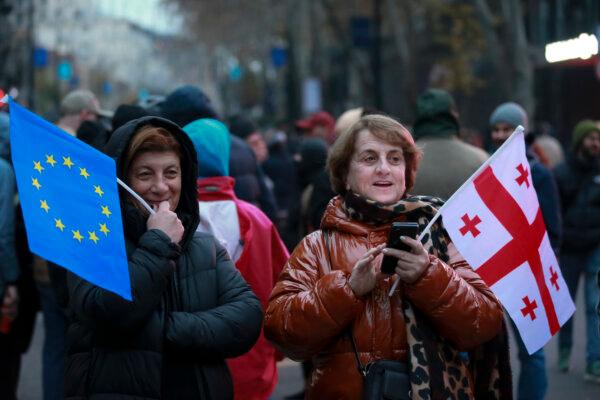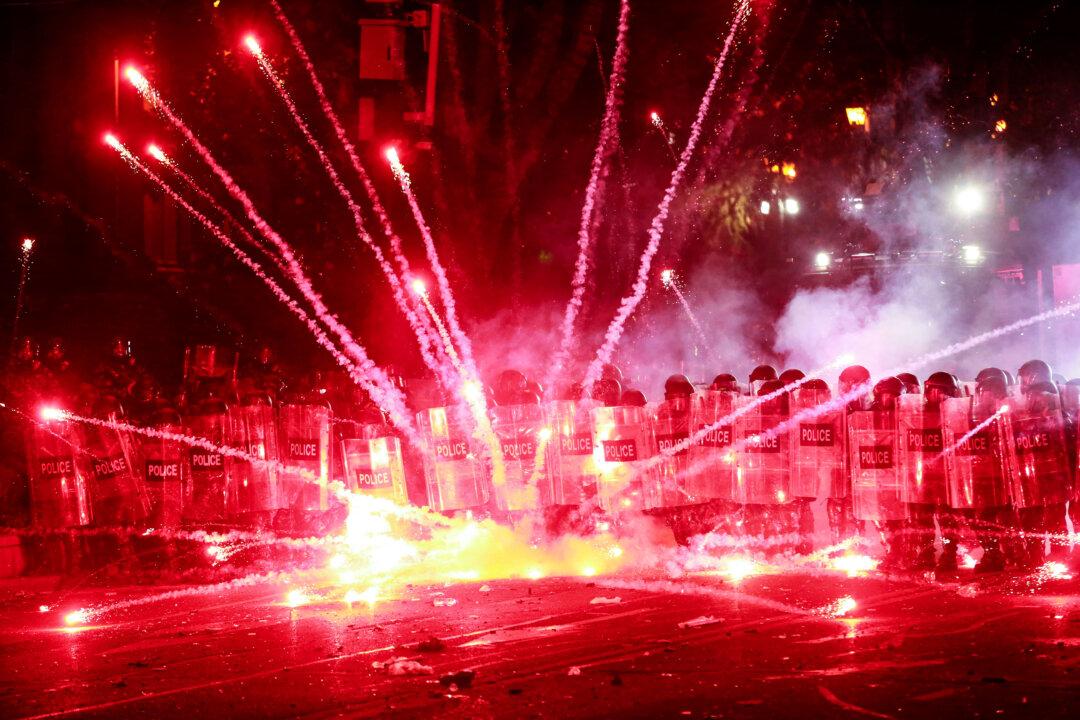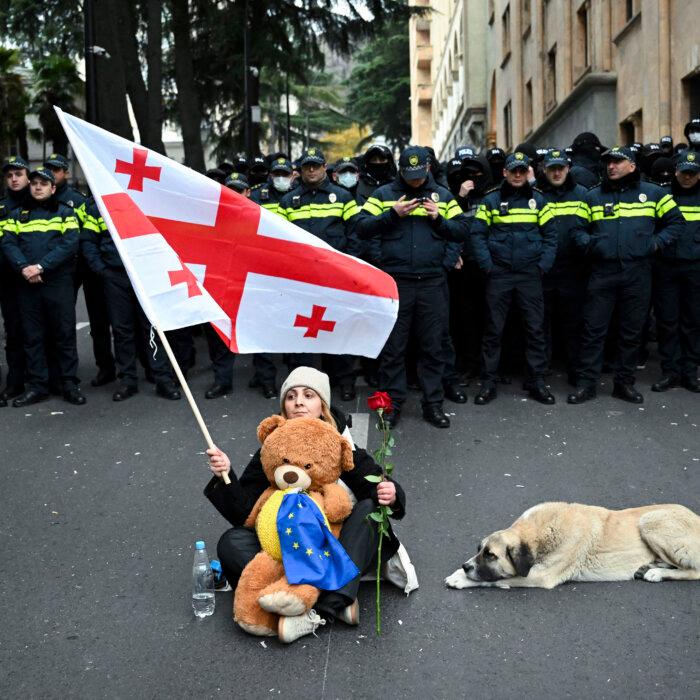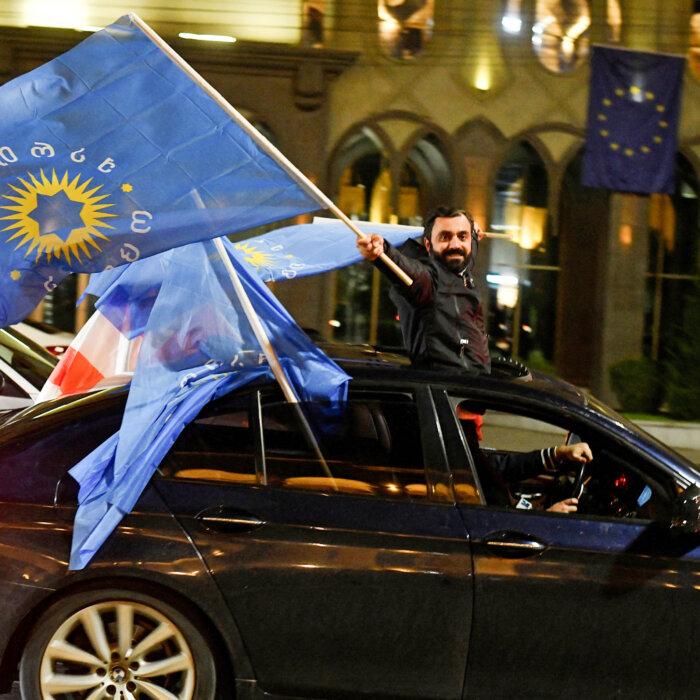Georgian President Salome Zourabichvili, in a standoff with her own government, has called on the country’s Constitutional Court to void the annual elections held last month, but her political rival, Prime Minister Irakli Kobakhidze, has warned protesters that “any violation of the law will be met with the full rigor of the law.”
Zourabichvili and the opposition claim that the Oct. 26 poll—which saw Georgian Dream win by garnering nearly 54 percent of the vote—was rigged under the influence of Russia.
Clashes on the night of Nov. 30 left 44 people in the hospital after police deployed water cannons and tear gas.
Tens of thousands of demonstrators gathered outside the parliament, throwing stones and setting off fireworks.
An effigy of the founder of the Georgian Dream party, Bidzina Ivanishvili—a billionaire who made his fortune in Russia—was set on fire.
The clashes continued on the night of Dec. 1, according to on-the-ground reports, videos on social media, and photojournalists.
Russia’s Interfax news agency reported that the police dispersed most of the protesters in the early hours of the night of Dec. 1, leaving only a small group near a metro station.
Interfax, quoting the Georgian Interior Ministry, said 113 police officers had been injured over the past few days.
The EU and the U.S. government have both stated that they were alarmed by Georgia’s apparent shift back toward a pro-Moscow stance.
The U.S. State Department said on Nov. 30 that it was suspending its strategic partnership with Georgia.
‘More Vulnerable to Kremlin’
“By suspending Georgia’s EU accession process, Georgian Dream has rejected the opportunity for closer ties with Europe and made Georgia more vulnerable to the Kremlin,” the statement reads.But Georgian Dream says it is seeking to defend the country’s sovereignty against outside interference.
Kobakhidze said, “Neither will those politicians who hide in their offices and sacrifice members of their violent groups to severe punishment escape responsibility.”
He denied that the government was stopping integration with Western Europe.
“The only thing we have rejected is the shameful and offensive blackmail, which was, in fact, a significant obstacle to our country’s European integration,” Kobakhidze said.
Georgia, on the southeast coast of the Black Sea, is considered part of the continent of Europe but has long been under the shadow of Russia.
It was conquered by the Russian tsars in the 19th century and was part of the Soviet Union—Joseph Dzhugashvili, better known as Stalin, was from Georgia—until it gained independence in 1991.
In 2008, Georgia fought a war with Russia over the breakaway region of South Ossetia.
In recent years, it has sought closer integration with Europe and the West, but Kobakhidze said on Nov. 30 that “foreign entities” wanted to see the “Ukrainization” of Georgia.
Referring to the events in a square in central Kyiv in 2014 that led to Ukrainian nationalists ousting Viktor Yanukovych, a pro-Moscow president, Kobakhidze said he feared a “Maidan-style scenario.”
In the wake of the so-called Euromaidan protests in Kyiv, Russia annexed Crimea and began supporting separatist forces in the Donbas region.
Kobakhidze Waits For Trump Administration
“This will not have any fundamental significance. We will wait for the new administration and discuss everything with them,” he said, a reference to President-elect Donald Trump, who will be inaugurated on Jan. 20.Zourabichvili said her country was becoming a “quasi-Russian” state.

“We are not demanding a revolution. We are asking for new elections, but in conditions that will ensure that the will of the people will not be misrepresented or stolen again,” she said.
“Georgia has been always resisting Russian influence and will not accept having its vote stolen and its destiny stolen.”
In the Oct. 26 election, Georgian Dream won 89 seats in the country’s parliament, with 54 percent of the vote, compared to two pro-EU parties, the Coalition For Change and the Unity-National Movement, which won just 35 seats with 22 percent of the popular vote.
The EU granted Georgia candidate status in December 2023 on condition that it met the bloc’s recommendations but put its accession on hold after Georgian Dream enacted a “foreign influence” law.
Kobakhidze said that there had been a “cascade of insults” from EU politicians and “the ill-wishers of our country have turned the European Parliament into a blunt weapon of blackmail against Georgia, which is a great disgrace for the European Union.”







